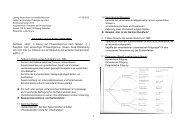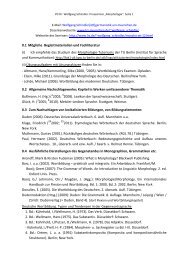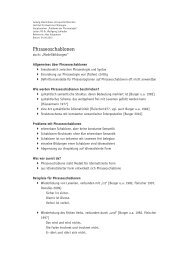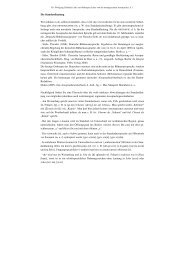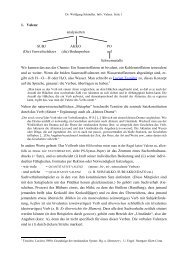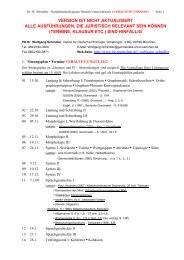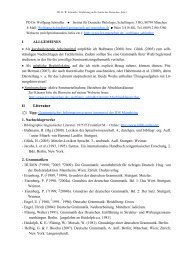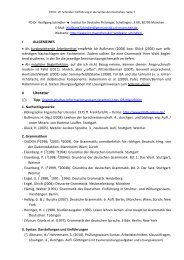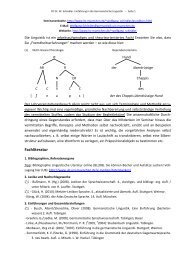Chapter 18 Lexical Functions: Description of Lexical Relations in a ...
Chapter 18 Lexical Functions: Description of Lexical Relations in a ...
Chapter 18 Lexical Functions: Description of Lexical Relations in a ...
Create successful ePaper yourself
Turn your PDF publications into a flip-book with our unique Google optimized e-Paper software.
—<strong>Chapter</strong> <strong>18</strong>. <strong>Lexical</strong> <strong>Functions</strong>— 21<br />
determ<strong>in</strong>es a lexical dependency which satisfies Conditions A1-A3 <strong>of</strong> Def. <strong>18</strong>.3: it is a <strong>Lexical</strong><br />
Function. However, it fails to satisfy Conditions 1 and 2 <strong>of</strong> Def. <strong>18</strong>.4: it also corresponds to a<br />
non-standard LF.<br />
Example 3<br />
In Russian, the mean<strong>in</strong>g (<strong>of</strong> brown color) has five different expressions depend<strong>in</strong>g on what<br />
it characterizes: for anyth<strong>in</strong>g but human eyes, human hair and horses the adjective KORIČNEVYJ<br />
is used; but (brown eyes) are KARIE glaza 〈*koričnevye glaza〉, (brown hair) is TËMNORUSYE or<br />
KAŠTANOVYE volosy 〈*koričnevye volosy〉, and (a brown horse) is GNEDOJ kon´ 〈*koričnevyj<br />
kon´〉. Therefore, the mean<strong>in</strong>g (<strong>of</strong> brown color) determ<strong>in</strong>es <strong>in</strong> Russian a lexical dependency which<br />
satisfies Conditions A1-A3 <strong>of</strong> Def. <strong>18</strong>.3: it is an LF. However, although unlike the mean<strong>in</strong>gs<br />
(without addition <strong>of</strong> a dairy product), (without addition <strong>of</strong> a product modify<strong>in</strong>g the taste) and (with<br />
the addition <strong>of</strong> cream), the mean<strong>in</strong>g (<strong>of</strong> brown color) satisfies Condition 1 <strong>of</strong> Def. <strong>18</strong>.4 (a huge<br />
variety <strong>of</strong> th<strong>in</strong>gs can be <strong>of</strong> brown color!), it fails Condition 2: it has only five different expres-<br />
sions and four <strong>of</strong> these (KARIJ, TËMNORUSYJ or KAŠTANOVYJ, and GNEDOJ) are used with very<br />
few specific arguments each (eyes, hair, horses). This mean<strong>in</strong>g equally is a non-standard LF <strong>of</strong><br />
Russian.<br />
Example 4<br />
The mean<strong>in</strong>g (which has 366 days) cannot be applied to anyth<strong>in</strong>g but YEAR: it constitutes a<br />
degenerate—and therefore non-standard—LF. Its expression appears only with YEAR and is fair-<br />
ly idiosyncratic: leap YEAR; cf. similar expressions Ger. SchaltJAHR lit. (switch year), Rus. visokos-<br />
nyj GOD [the adjective VISOKOSNYJ cannot be used outside <strong>of</strong> this phrase], Serb. prestupna<br />
GODINA [the adjective PRTESTUPNI cannot be used outside <strong>of</strong> the given phrase, either]. In French,<br />
this mean<strong>in</strong>g is applicable to two nouns: AN (year) and ANNÉE ((duration <strong>of</strong> a) year); but it pro-<br />
duces a correct collocation only for ANNÉE: année bissextile, *an bissextil.<br />
Degenerate non-standard LFs are characterized by unique cooccurrence <strong>of</strong> the collocate: it<br />
comb<strong>in</strong>es with just one base (or with very few near-synonymous bases). Thus, bleary/beady EYES,<br />
aquil<strong>in</strong>e NOSE, husky VOICE, artesian WELL, bubonic PLAGUE, LOOK for a needle <strong>in</strong> a haystack are all<br />
examples <strong>of</strong> degenerate non-standard LFs <strong>of</strong> English (the keywords—collocation bases—are<br />
capitalized).<br />
@@Easternn Europe vs. East Africa, Afrique orientale<br />
Although theoretically the dist<strong>in</strong>ction between normal non-standard and degenerate non-<br />
standard LFs is quite clear, <strong>in</strong> practice, i.e., with respect to specific collocations, it is not always


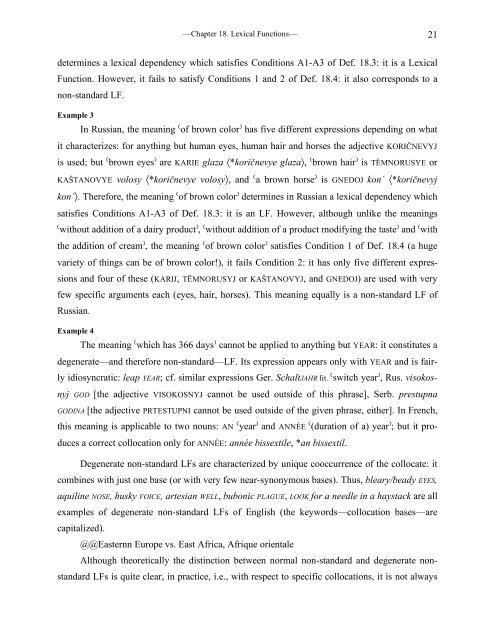
![E-Mail: Wolfgang.Schindler[ätt]germanistik.uni-muenchen.de Web ...](https://img.yumpu.com/51590147/1/184x260/e-mail-wolfgangschindlerattgermanistikuni-muenchende-web-.jpg?quality=85)
